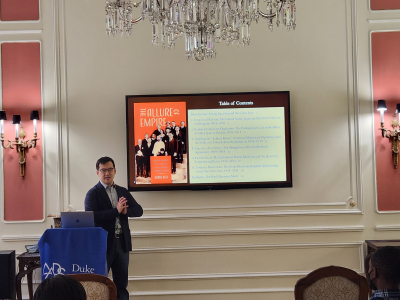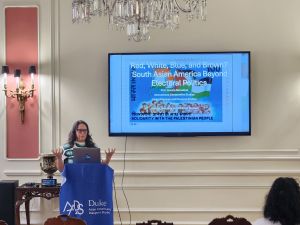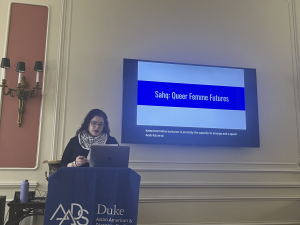The Allure of Empire: American Encounters with Asians in the Age of Transpacific Expansion and Exclusion

Chris Suh is an Assistant Professor of History at Emory University and drew from his recent book, The Allure of Empire: American Encounters with Asians in the Age of Transpacific Expansion and Exclusion (Oxford University Press, 2023), during his talk for the Spring 2024 AADS Speaker Series on February 23.
Suh began by asking to reconsider the way the United States government chose to exclude different Asian immigrants beyond the conventional understanding of exclusion laws being implemented based on the chronological order in which Asian people immigrated to the United States.
He talked through this reconsideration by tracing the contexts that led to the Johnson-Reed Act of 1924. He began from the setting of the Russo-Japanese war (1904-1905), as it was the first time a nonwhite power (Japan) was not only fighting with, but also defeating a white imperial power (Russia). Moreso, Japan had been expanding its empire through the conquest of Asian and Pacific Islands regions like Korea. This led white American imperialists and elites like Theodore Roosevelt to declare U.S. support for Japan as an imperial partner. In political cartoons, Japan was portrayed as the harbinger of progress whereas “The Yellow Peril” were countries like Russia, Poland, and Finland. Soon after, the Gentlemen’s Agreement was passed, and while it was understood as Japanese exclusion, data showed that the Japanese American population continued to grow even after the policy was implemented. Suh posited that this failure of policy was intentional, and the U.S. government wanted Japanese Americans to be treated differently as opposed to other Asian immigrants.
Seven years later, discourse around U.S.-Japanese relations grew. Theodore Roosevelt, although no longer president, continued defending Japan by arguing that Japan’s colonization of Korea was a civilizing mission. The Journal of Race Development placed Japan and Japanese Americans on a pedestal along with the Aryan race because of their ability to “civilize”. But there was also growing anti-Japanese sentiment, the most convincing of which came from V.S. McClatchy, a powerful newspaper owner. He argued against Roosevelt’s point to say that Japanese/Americans were not kind and civilizing, citing anticolonial struggles in Korea and Japan’s Imperial Ordinance. Korean Americans also reached out to McClatchy with an interest in collaborating with white supremacists to defeat the Japanese empire and gain sovereignty for Korea.
This new narrative of Japan eventually led to the Johnson-Reed Act of 1924, a Japanese exclusion bill. Yet Suh noted the continuation of “allure to empire” in the following decades, especially the collaboration of the U.S. and Asian countries to fight against Japan and communism for “decolonization.”




